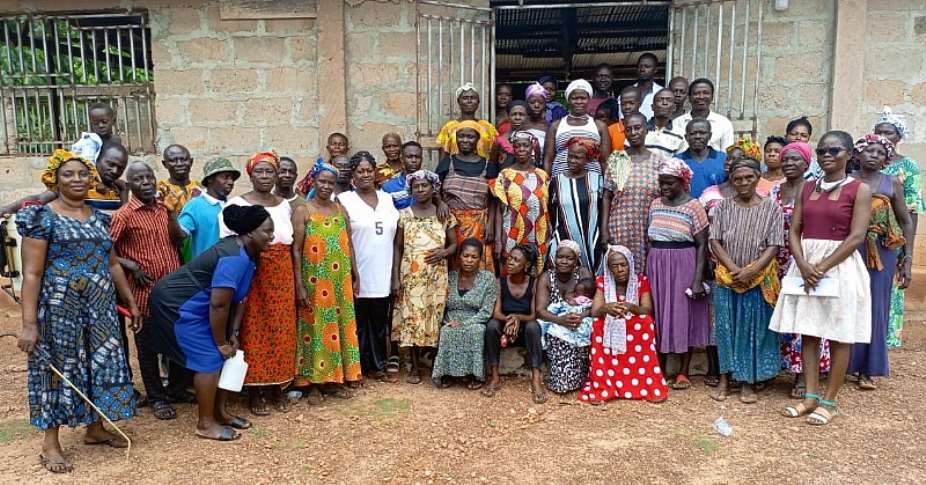About 70 farmers of Abonsuaso near Tepa in the Ashanti region have benefitted from a day’s training on indigenous techniques to improve productivity and reduce climate change impacts.
The farmers were taken through topics such as effects of climate change on the environment, crop rotation techniques, effects of some agro-chemicals on crops and humans, how to prepare organic manure, how to prepare organic weedicide and pesticide and contemporary farm practices that significantly improve yield.
It was organised by the Fosukrom Women Farmers Association (FWFA), a local farmer group in the Bia East District of the Western North Region, with support from the Global Greengrants Fund (GGF).
As part of the training, the participants were schooled on how to prepare and properly apply organic herbicides and pesticides to improve crop yields, among others.
This formed part of efforts by FWFA to discourage farmers from relying on imported fertilizers and agro-chemicals, and instead adopt and apply indigenous technology in their farming to improve crop yields and mitigate climate change impact in the area.
Background
As a predominantly farming community, most people in Abonsuaso are engaged in plantain, cocoyam, maize, yam, cassava, cocoa, oil palm farming and few of them into vegetable production.
In recent times, the area has been experiencing frequent droughts and outbreak of diseases resulting in low crops yields leading to hunger and high poverty particularly among the women farmers.
This situation most often compels these farmers to use synthetic agrochemicals in controlling pests and diseases, which later affect their health, destroy soil quality, enhance climate change impacts and poison biodiversity through run-off water.
The training at Abonsuaso was therefore aimed at mobilizing and preparing the farmers on how to use organic (indigenous) herbicides and pesticides for their farming which has no adverse impacts on the environment or negative influence in the climate change or land fertility but cheaper (little or no cost) and can improve productivity.
Crop production
A Resource Person, Lucy Annor, touched on some human activities that negatively impact on the climate and noted that various human activities have led to what she described as “climate crisis.”
She said besides contributing to climate change, a lot of farmers have developed all kinds of diseases such as blindness and wrinkled skin mainly due to the consistent use of agro-chemicals while soil fertility has adversely been affected.
Madam Lucy Annor further took the participants through how to prepare organic fertilizer, crop rotation practices and benefits of using organic herbicides and weedicides.
The Executive Director of Livelihood and Environment Ghana (LEG), Mr Richard Adjei-Poku, who was one of the Resource Persons threw more light on measures to be undertaken to mitigate the effects of climate change on the environment.
Welcoming the participants earlier, Madam Mavis Odoi, the Secretary of the FWFA, expressed appreciation to the GGF for the funding support, which had also well positioned the Association to intensify farmer-education on remote causes, impacts and the debilitating consequences of climate change.
She said with the education, many of the farmers had understood why they should not fell trees haphazardly, burn their farms and avoid farming close to river and water bodies.
Demonstration
As part of the training, there was a practical demonstration of how nim tree (a popular local tree) can be mixed with blended cassava to serve as herbicide or a mixture of Acheampong leaves, konkroma plant and salt to serve the same purpose.
The participants also learnt how to combine konkroma leaves soaked for about two days with a piece of soap and then sprayed on cocoa to fight akate and other diseases that usually attack cocoa trees.
Also, nim tree soaked for about two days and a piece of key soap added can serve as an effective pesticide for cocoa, maize and vegetables.






 DR Congo thwarts Kinshasa 'coup attempt': army
DR Congo thwarts Kinshasa 'coup attempt': army
 Media has made good progress in Ghana — Frema Opare
Media has made good progress in Ghana — Frema Opare
 E/R: We will demonstrate against our parliamentary candidate for disappearing af...
E/R: We will demonstrate against our parliamentary candidate for disappearing af...
 Kotokuom elders issue ultimatum to Kwaku Boah to stop defaming Atwima Agogohene ...
Kotokuom elders issue ultimatum to Kwaku Boah to stop defaming Atwima Agogohene ...
 W/R: Tragic premix explosion injures 16 in Ngyirasia
W/R: Tragic premix explosion injures 16 in Ngyirasia
 Election 2024: NDC pledges to scrap betting tax, targets 80% youth support
Election 2024: NDC pledges to scrap betting tax, targets 80% youth support
 Mahama was a one-term president because he was incompetent and brought untold ha...
Mahama was a one-term president because he was incompetent and brought untold ha...
 Blame IMF programme for Cedi's decline —Prof Bokpin
Blame IMF programme for Cedi's decline —Prof Bokpin
 Court denies Kasoa soldier killer bail
Court denies Kasoa soldier killer bail
 Ahmed Suale's killers will be brought to justice no matter how long it takes - A...
Ahmed Suale's killers will be brought to justice no matter how long it takes - A...
